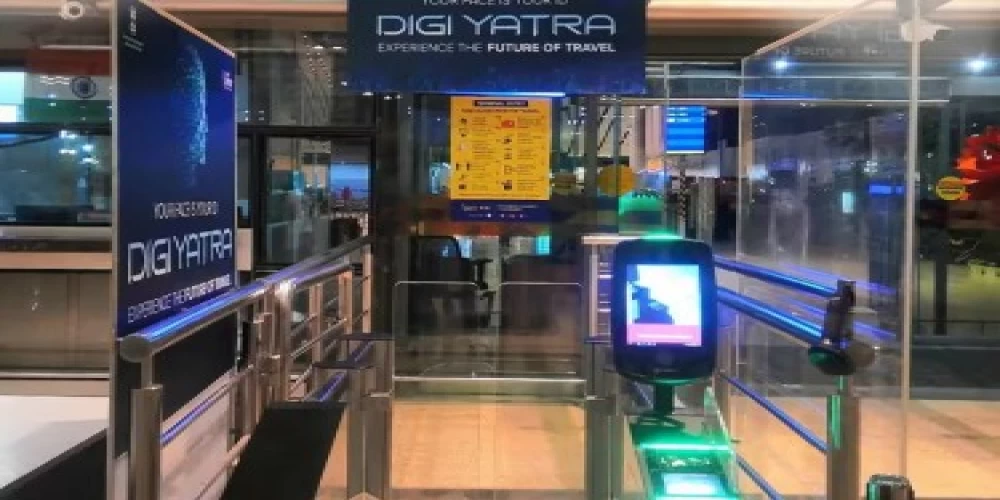Kolkata, India – In a major step toward modernizing India’s aviation infrastructure, Netaji Subhas Chandra Bose International Airport in Kolkata has launched the DigiYatra platform, introducing facial recognition-based contactless travel for domestic passengers. With this move, the bustling eastern metropolis joins India’s ambitious push to transform airports into smart, sustainable, and tech-forward travel hubs.
Unveiled as part of Phase II of India’s DigiYatra rollout, this initiative positions Kolkata at the forefront of a national strategy aimed at enhancing airport efficiency, improving passenger experience, and reducing carbon emissions through automation and digitization.
What is DigiYatra?
DigiYatra is a biometric-enabled digital processing system that uses facial recognition technology (FRT) to automate passenger identity verification at various checkpoints—entry gates, security checks, and boarding. Launched by the Ministry of Civil Aviation, the platform eliminates the need for physical ID and boarding pass verifications, ensuring faster, safer, and contact-free travel.
First introduced at airports in Delhi, Bengaluru, and Varanasi in late 2022, the platform’s success prompted an expansion to Kolkata, Hyderabad, Pune, and Vijayawada in 2023–2024. Kolkata’s implementation marks a significant milestone in eastern India’s air travel modernization efforts.
A Transformative Step for Passenger Experience in Kolkata
The new system enables domestic travelers to glide through Kolkata airport checkpoints using only their face as identification. By reducing reliance on manual ID checks, DigiYatra streamlines passenger flow, reduces queuing times, and enhances operational efficiency.
Passengers can register on the DigiYatra app and upload their travel credentials in advance. Upon arrival, their face becomes their boarding pass, enabling a seamless experience from terminal entry to aircraft boarding.
Key benefits include:
- Faster processing times at check-in and security
- Reduced congestion at peak hours
- Improved hygiene through contactless procedures
- Enhanced accuracy in identity verification
- Decreased carbon footprint through efficient energy use
The system is particularly beneficial for transit passengers, allowing swifter and smoother transfers at one of India’s busiest air hubs. As air traffic in Kolkata increases, these upgrades will help the airport handle greater volumes without requiring significant infrastructure expansion.
Strengthening Security and Health in a Post-COVID World
DigiYatra enhances security and public health by minimizing physical interactions between travelers and airport personnel. The biometric system reduces risks of document fraud and manual entry errors while eliminating the need for physical document exchange—an important step in building traveler confidence post-pandemic.
According to the Airports Authority of India (AAI), DigiYatra supports both national safety priorities and the global trend toward touchless, tech-enabled travel.
A Catalyst for India’s Digital and Green Airport Vision
India’s aviation sector is experiencing rapid growth, with domestic air passenger traffic expected to reach 412 million by 2036 (DGCA). As demand surges, smart technologies like DigiYatra are critical to ensuring that infrastructure keeps pace.
The government’s vision for a “Digital India” includes transforming transportation infrastructure into efficient, environmentally sustainable systems. DigiYatra aligns with this goal by:
- Minimizing paper-based processes
- Reducing energy usage from long passenger queues
- Enabling infrastructure efficiency without large physical expansion
Kolkata’s deployment of DigiYatra contributes to India’s broader sustainability goals, including its commitment to reach net-zero carbon emissions by 2070. By improving energy efficiency at airports, the platform plays a small yet strategic role in decarbonizing the transportation sector.
How It Works: A Step-by-Step Overview
- Pre-Enrollment: Passengers register on the DigiYatra mobile app using Aadhaar-based verification and submit flight details.
- Facial Capture: At the airport, cameras match live facial data with the encrypted profile stored in the system.
- Checkpoint Integration: Passengers walk through entry, security, and boarding gates without showing ID or tickets.
- Data Privacy: DigiYatra uses blockchain technology to protect passenger data, which is automatically deleted after 24 hours of travel.
The platform is voluntary, and conventional travel documentation options remain available for those not enrolled.
Kolkata Airport’s Digital Transformation in Context
Kolkata’s Netaji Subhas Chandra Bose International Airport handled 22 million passengers in FY 2023–24, making it one of the top five busiest airports in India. With tourism to West Bengal steadily increasing and Kolkata serving as a transit hub to the Northeast and Southeast Asia, the demand for improved airport efficiency has never been higher.
The DigiYatra system empowers Kolkata to manage rising footfalls while delivering a smoother passenger journey, especially during the high-travel seasons associated with Durga Puja, winter holidays, and international events.
Looking Forward: More Cities, More Efficiency
The DigiYatra initiative will continue expanding in 2025, with Chennai, Goa, Ahmedabad, Jaipur, and Guwahati on the radar for future deployment. The government’s long-term vision is to introduce the system at all major Indian airports, covering both domestic and international travel.
Union Minister Jyotiraditya Scindia emphasized the significance of this transformation: “DigiYatra reflects the convergence of India’s digital ambitions and its commitment to world-class infrastructure. It’s not just about faster travel—it’s about building trust, safety, and sustainability into every journey.”
Conclusion: Kolkata as a National Leader in Smart Travel
With the launch of DigiYatra, Kolkata has taken a pioneering role in shaping India’s aviation future. By offering faster, contactless, and safer airport experiences, the city is setting a new benchmark for how technology can revolutionize travel.
As smart airport technologies continue to evolve globally, Kolkata’s integration of biometric systems ensures it remains competitive, connected, and forward-facing. More than just a tech upgrade, this launch is a symbol of how India’s cities are preparing for the future—one passenger, one journey at a time.
For more travel news like this, keep reading Global Travel Wire
Disclaimer: This image is AI generated and may bear no resemblance with actual fact or images


















